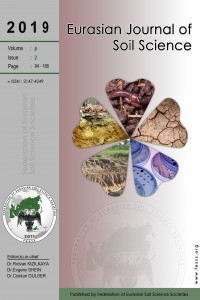
Eurasian Journal of Soil Science
Yazarlar: Ayten NAMLI, Ahmad MAHMOOD, Bahar SEVİLİR, Emre ÖZKIR
Konular:Fen
DOI:10.18393/ejss.293157
Anahtar Kelimeler:Phosphorus solubilizing bacteria,Rhizosphere,Bulk soil,Alkaline phosphatase,Β-glucosidase,Basal soil respiration
Özet: Application of chemical fertilizers besides economic concerns has been a reason of environmental and ecosystem degradation, so sustainable organic agriculture is becoming popular in researches and among farming communities. Phosphorus holds second position after nitrogen among macronutrients required for better plant growth and is needed in higher amounts. Meeting this high phosphorus input for better crop yields causes environmental problems like eutrophication, so phosphorus solubilizing bacteria (PSB) and plant growth promoting rhizobacteria (PGPR) are being emphasized to utilize phosphorus fixed in soil layers. This study was carried out to evaluate the effect of PSB on plant growth, soil biological properties including enzymes and soil respiration. Treatments including control, 50 mg kg-1 nitrogen, 50 mg kg-1 nitrogen and 12 mg kg-1 phosphorus applications reduced dosage of nitrogen 25 mg kg-1 with PGPR and 25 mg kg-1 nitrogen along with 0.12 g raw phosphate and PGPR. Results indicated that plant parameters like above and below ground plant biomasses (fresh and dry weight), plant nitrogen and phosphorus content were significantly enhanced in all the treatments when compared with the control. While soil pH in rhizosphere significantly increased with the treatments, bulk soil pH decreased with PGPR treatments when compared with all other treatments. EC values in rhizosphere and bulk soils were not significantly influenced with the treatments. Rhizospheric and bulk soil showed high amount of N, P and organic matter in PGPR treatments. Alkaline phosphatase and β-glucosidase activities were found significantly higher in the last treatment than the other treatments. Basal soil respiration was interestingly found higher in control soil but did not differ statistically from the other treatments. Concluding, application of PGPR with lower amounts of chemical fertilizers can reduce the use of chemical fertilizers and has also potential of improving soil health in long term aspects.